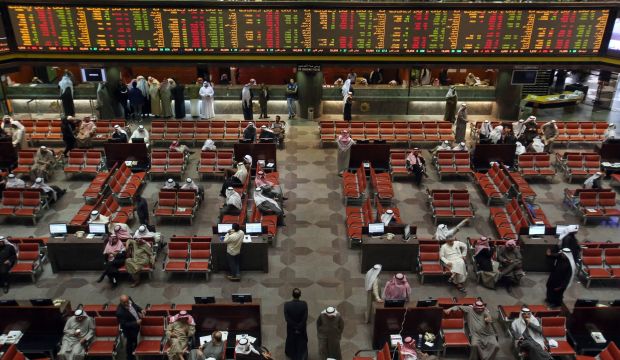
Kuwaiti traders follow the market’s movement at the Stock Exchange in Kuwait City on December 18, 2014.
(AFP Photo/Yasser Al-Zayyat)
Dubai and United Arab Emirates, Asharq Al-Awsat and AP—Gulf equity markets made massive gains Thursday with Dubai’s main stock market rising 13 percent, just two days after closing at its lowest point of the year.
Abu Dhabi’s stock market closed 6.7 percent higher on Thursday while the Saudi index closed 8.9 percent higher.
The upswing in Gulf equities comes on the back of a rise in the price of benchmark US crude, which closed 54 cents higher at 56.47 US dollars on Wednesday. Brent crude gained 1.17 dollars to close at 61.18 dollars. On Thursday, Brent crude fell after early gains reaching 63.70 dollars to trade back below 62 dollars a barrel.
It also came a day after the US stock market had its best day in more than a year after the Federal Reserve said it foresaw no interest rate hikes in the first quarter of 2015.
Arabtec, Dubai’s largest construction company, and Emaar, the developer behind the world’s tallest tower in the United Arab Emirates, gained 15 percent Thursday on the Dubai stock exchange. Both had lost around 10 percent in trading Tuesday.
“These are volatile times,” Sachin Mohindra, portfolio manager of the Gulf Cooperation Council fund at Invest AD, said. “What we’re seeing [today] is positive sentiment on the backs of global events.”
Analysts say investor concerns that the drop in oil price could lead to less government spending and reduced economic growth were alleviated Wednesday when Saudi Arabia’s Finance Minister Ibrahim Al-Assaf said his country would not cut on capital spending for the 2015 budget—a sentiment reiterated by officials across the Gulf. The Saudi budget is expected to reflect a deficit for the first time in years.
Because governments in the region are still key drivers of the economy, lower oil prices will only reflect in government spending if prices stay low for a very prolonged period, Mohindra said.
International Monetary Fund mission chief to the UAE, Harald Finger, told The Associated Press that the fund is in the process of revising growth projections for the region and that the new outlook will reflect a moderate downgrade that factors in the slide in oil prices.
“I expect we might revise down the growth projection, but not in a major way, he said.
